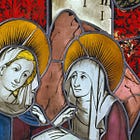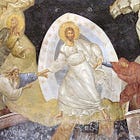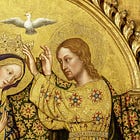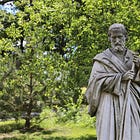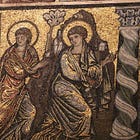The Visitation – faith confirmed, St John the Baptist awakened and sanctified
In the Visitation, so familiar in the Rosary, Our Lady's presence with Christ in her womb was the occasion of God awakening and sanctifying St John the Baptist and confirming faith in all around her.
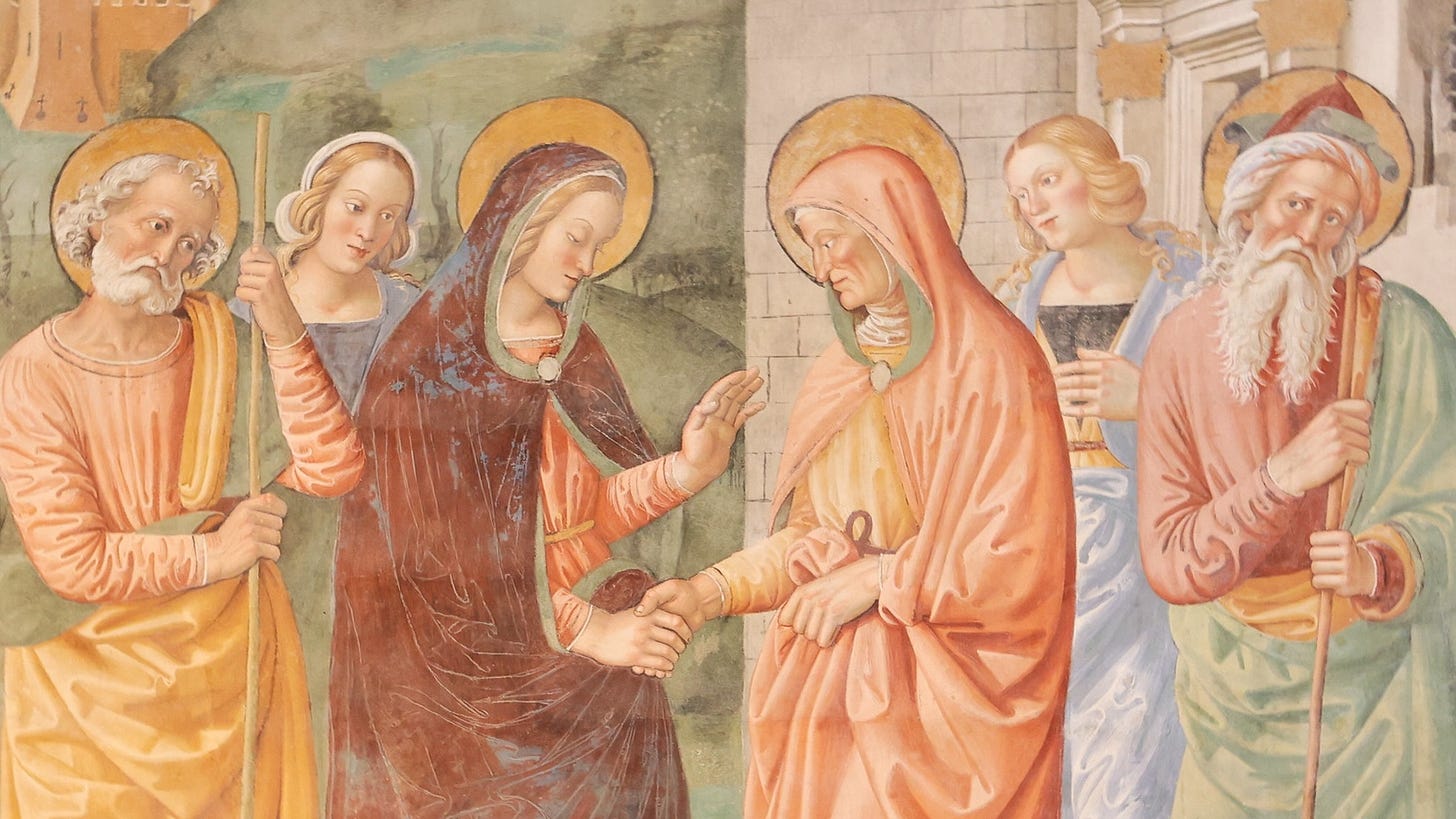
From
The Nine Months: The Life of Our Lord in the Womb
Fr Henry James Coleridge
The Visitation – Part II
Part I available here:
The salutation of Our Lady
The salutation of our Blessed Lady to her cousin was probably the ordinary greeting of love and affection, without more than might show that she was aware of the great blessing which had been vouchsafed to St. Elisabeth. At least we have no mention in the Gospel account of anything more.
But the words of Mary, who had within her womb the Incarnate God, were words of power as well as simply significative of the thoughts or goodwill of the speaker.
Thus, the moment that they sounded in the ears of St. Elisabeth, two wonderful outpourings of grace followed.
The one of them affected the infant Baptist in his mother's womb, while the other wrought wonderful effects in his mother herself. St. Elisabeth was the first to hear the blessed words of the salutation of Mary, but the effect of grace appears to have followed first in her infant son.
The words struck on the ears of the mother, but their power first reached the soul of St. John. Their effect was his sanctification in the womb, that gift which had been predicted for him by St. Gabriel, when he was commissioned to announce to his father Zachary the conception of the Precursor.
Gabriel had said that he was to be filled with the Holy Ghost even from his mother's womb. The effect which now followed is dwelt on by many of the holy writers of the Church. Up to that moment the soul and body of the Baptist had shared the common lot of the souls and bodies of all infants born of the race of Adam.
The soul had been joined to the body at the instant of conception, but the life which they had shared together had been the usual life of obscurity, slow advance in natural growth, the intellectual faculties in germ rather than in activity, with only that kind of animal consciousness which is usual in such cases. They lay under the ban of original sin.
The prayers of his holy parents had risen continually for St. John, ever since his conception, but the moment of his delivery from the common state of distance from God had not yet come. He was a holy child, if his parents merits could have made him holy, but no merits of theirs could roll away for him the cloud which hung over his existence on account of his descent from Adam.
Effect of Our Lady’s voice
The voice of our Blessed Lady, which conveyed the power of the Divine Infant Who lived in her womb, altered the whole state of the blessed child of Elisabeth.
When St. Peter lay in his prison in Jerusalem, the holy text tells us that "an Angel of the Lord stood by him, a light shined in the room, and striking Peter on the side, he raised him up, saying, Arise quickly, and the chains fell off from his hands."1
This may be taken as a kind of image of what took place in the womb of St. Elisabeth.
The voice of the Mother of God was as the Angel who stood by St. Peter. The room was filled with light. That is, the whole existence of the child, dark and sad and sombre before with the overhanging cloud of the displeasure of God, or at least of the absence of His grace, was full of light and joy and life.
The chains fell off, the bonds of original sin, the imperfections and penalties of the state of estrangement from his Creator, the miseries of an intelligence merged in torpidity and a will fettered by impotence, a mind clouded with ignorance and a heart in which there had been as yet no spark of love. The Angel said to Peter, "Arise quickly," and the arising of the soul of the child of Elisabeth was rapid indeed.
Sanctification of St Joshn
He was at once awakened by Divine grace to the full use of his faculties, and the streams of grace, bearing on their bosom the virtues, theological moral and infused, and the gifts of the Holy Ghost, poured themselves into and over his soul.
He understood his God, he knew his own relations to Him, the end for which he was made, the office he was to discharge.
He broke out at once into the full exercise of faith and hope and charity. He knew the presence of our Lord, he knew Who He was, and what was His work in the world for his salvation and the salvation of all mankind.
The change which in others is gradual and progressive, from one point of intelligence to another, was made in him in a moment. He at once became perfect man in the use of his intelligence and will, and in the knowledge of Divine things and of his own duties.
The sun rose on him in a moment, without any preceding twilight. And at the presence of his Lord and Saviour, he, the first of all as far as we know, except the Blessed Mother, manifested by outward sign his joy and love and reverence, and homage. He leapt in the womb for joy.
Illumination of St Elisabeth
At the same time another great operation of grace was going on in the soul of the blessed Elisabeth herself.
It is commonly said by the Fathers who have spoken on this mystery, that the Child was first illuminated and then the mother, and that the Divine illumination passed from the soul of the Child to the soul of the mother, as the power of grace which was exerted in their favour passed first from the Child in the womb of Mary, and then by means of her voice reached the soul of St. John and then the soul of Elisabeth.
The Scripture does not tell us the order of these sanctifications, though the opinion of the Fathers is enough for the authority of the account just given.
Elisabeth was filled with the Holy Ghost. She received the full illumination needed for her comprehension of the mystery and for her own witness thereto.
She may have seen in her cousin, when she first embraced her, nothing more than the marvellously gracious and unearthly maiden whom she may have seen not long before in the precincts of the Temple. She may have known something of her wonderful gifts from her birth.
She may have been present at her presentation in the Temple. She may have conversed about her with the holy Joachim and Anna. She may have marvelled what was to be the destiny of one so singularly marked out for great things by the circumstances of her birth and childhood.
She may have known of her marriage to the blessed Joseph, but she could have had no thought of the dignity to which she had now been raised. She might have welcomed her with joy and love, but without veneration.
But as soon as the voice of her salutation sounded in her ears the infant leaped in her womb for joy.
What she knew
These simple words contain the whole of what we have been saying about the sanctification of the Baptist, and they also signify the cause of the further grace now bestowed on his mother.
Elisabeth understood by a Divine light, what had taken place. She understood the mystery of the Incarnation, the fulfilment of the prophecies, the beginning of the accomplishment of the salvation of the world.
She knew that our Lord was there present in the womb of His mother. She understood the leaping of her babe in her own womb as his greeting and joyous homage to the Incarnate King, and that it was no simply natural or involuntary movement, but the deliberate expression of joy, which signified that he had so much at which to rejoice, in the accomplishment in himself, at that moment, and by virtue of the salutation of our Lady, of the promise of spiritual deliverance and elevation which had been made to his father concerning him at the time of the announcement of his future conception.
More than this, the words of St. Elisabeth show also that she had then revealed to her the details of the Annunciation itself as made by the Angel to Mary. Her words take up the very words of the salutation of Gabriel, and complete them.
The Angel had stopped short at the declaration of the blessedness of Mary, before the Incarnation had taken effect. Elisabeth continues, in the words which the Church has ever since used, to declare the blessedness of the fruit of the womb of Mary, after the Incarnation had taken effect.
All these evidences of the wonderful effect which followed on the salutation of our Lady are contained in the few words in which the Evangelist relates what now passed.
"Elisabeth was filled with the Holy Ghost and she cried out with a loud voice and said,
"'Blessed art thou among women, and blessed is the fruit of thy womb! And whence is this to me, that the mother of my Lord should come to me? For behold, as soon as the voice of thy salutation sounded in my ears, the infant in my womb leaped for joy.
"'And blessed art thou that hast believed, because those things shall be accomplished that were spoken to thee by the Lord.'"
Words of St Elisabeth
The loud cry of this venerable saint must be understood as the effect of the great fervour of spirit in which she spoke.
She spoke under the immediate impulse of the Holy Ghost, and the revelation to her of the wonderful mysteries of the Incarnation could not have preceded her words by many seconds of time.
Mary's salutation had probably been gentle and modest, in a low tone of voice, and St. Elisabeth is moved so strongly by the Holy Ghost that she cannot contain herself. "Blessed art thou among women!"
These words are, as has been said, the last words of Gabriel's salutation and the first of hers. They contain in her mouth all that they contained in his. She adds the other words, "blessed is the fruit of thy womb," showing that she knew of the accomplishment of the mystery which the Angel had spoken of as future.
Both Mary and the fruit of her womb are blessed in the highest degree and measure. But He is the source of all blessing, He cannot be otherwise than most blessed, because He is the Incarnate God. Mary, in all her blessedness, receives from His fulness in this as in all other respects.
In this sense it is that the Fathers say that the latter blessedness is the cause of the former, though the blessedness of Mary is truly and perfectly such. The next words of St. Elisabeth seem the natural acknowledgment on her part of the great favour and honour done to her by the visit of her cousin. "Whence is this to me?" What merit is there in me, that, when I ought to be waiting on her and paying my homage to her, the Mother of my Lord should instead come to me?
Then she goes on to declare, not exactly how it is that she has known what has passed, but the wonderful effect, in herself and in her Child which have followed from the salutation of Mary.
Leaping of the child in her womb
The reason and cause of the knowledge of St. Elisabeth concerning the Incarnation could not be the leaping in her womb of the unborn child.
The reason for her knowledge was that she was filled with the Holy Ghost, and especially for the purpose of her being a witness to, and so far in some sort a companion of, Mary, in the accomplishment of the designs of God. The leaping of her Child in the womb was an evidence to her of the change that had been wrought in him and in his favour, by the presence of the Unborn God and the voice of His Blessed Mother.
In this sense we may understand the connection between the words of St. Elisabeth. She knew that the fruit of the womb of Mary was most blessed, because He was at that moment manifesting His spiritual power, as present in Mary, by the sanctification of His Precursor.
Thus the exultation of the Child in her womb was an evidence of the presence of the Incarnate God in the womb of Mary, and not only of His presence, but of the active exercise by Him of that power of sanctification which belonged, and could belong, to Him alone.
For she understood by the enlightenment of the Holy Ghost, as we have said, that the leaping of her Child was nothing less than a manifestation of his full intelligence of the mystery of the Incarnation, and of his joy and gratitude at the wonderful share which he himself had then and there received of the spiritual blessings with which that mystery of Divine condescension was fraught.
Blessedness of Mary
This may supply the reason why St. Elisabeth first speaks of the leaping of her child in her womb.
It was an evidence of the marvellous effects on his soul of the presence of his Lord. He came to be the prophet of the Highest, as his father sang afterwards in the Benedictus, and now, as some of the Fathers are fond of saying, he anticipated his office and declared preternaturally the presence of his Lord.
St. Elisabeth goes on at once to speak of the blessedness of Mary. She is not only the blessed among women, as having been chosen from all eternity to be the Mother of God, as having been, after her Divine Son, the great subject of prophecy and of type, as having been brought into the world in the wonderful way and with the wonderful privileges which belong to her great vocation, but also as having corresponded most faithfully and most perfectly in the time of her trial to the designs of God, and so having secured the execution of the Divine promises conveyed to her at the time of that probation by the mouth of the Angel.
This is the meaning of the last clause of the greeting of St. Elisabeth:
"Blessed thou that didst believe, because those things shall be accomplished that were spoken to thee by the Lord."
This shows us that St. Elisabeth, as has been said, was at this time divinely enlightened as to what had passed between the Angel and our Blessed Lady, and that she now is commissioned to give on the part of God a further assurance to her that the great promises shall be accomplished. Her Son is to be the Son of the Highest. He is to have given Him by God the throne of His father David.
"He is to reign in the house of Jacob for ever and of His kingdom there shall be no end."
These are the things that were then spoken to our Lady by the Lord. For the still more wonderful things which formed the last portion of the message of Gabriel, that the Holy Ghost should come upon her and the power of the Most High should over- shadow her, and that the Holy One to be born of her should be the Son of God, had already had their fulfilment and were no longer future, nor could the blessing which they conveyed to her ever be recalled.
Connection of the mysteries of the Incarnation and Visitation
This prophecy of St. Elisabeth shows us the very close connection between the two mysteries of the Incarnation and Visitation.
It may be said, in a certain sense, that the former mystery is incomplete without the latter. Not that anything could be added to the truth and completeness of the Incarnation by any number of subsequent mysteries, but that the Divine counsels required that the relation between these two mysteries should be established through the confirmation of the former by the circumstances of the latter.
We have seen that the last words of St. Gabriel at the Annunciation referred to the conception of the Precursor in the womb of St. Elisabeth, and they implied, though not by way of direct command, that it was the will of God that Mary should immediately undertake the journey which ended in the Visitation.
For it was the rule in the revelation of any most sublime mystery that something should be added by way of confirmation or sign of the truth which had been revealed, even though there was not exactly any need, in the soul of the saint to whom the revelation was made, of such confirmation for the purpose of securing his faith in the revelation itself.
In the same way, the fulfilment of the sign given by way of this confirmation is a part of the Divine counsel in such cases, and it is this completeness which is added by the Visitation.
Confirmation of faith
It is needless to insist how clear it is, that the faith of Mary would have been the same if she had never gone to visit her cousin, and if, when with her, she had not received this magnificent testimony to the truth of the message of the Angel.
Her faith would have been the same, in its essential perfection, but it cannot be supposed that the circumstances of the Visitation did not send a glow of joy through the heart of Mary, making her faith itself full of its own radiance.
Nothing can be added to the essential happiness of the Saints, and yet they can receive an accession of joy when they are specially honoured in the Church on earth. In this sense Mary herself might be confirmed by these new prodigies.
Their natural effect was that all who knew them should be so confirmed. And in the unfolding of the Divine mysteries to the gaze of Angels and of men, it is easy to see how much is added to the splendour of the Incarnation by the Visitation.
The Visitation gave God the opportunity of declaring, by a series of marvels of the highest kind, that what He had promised to Mary by the mouth of Gabriel had already been performed as far as the Incarnation of His Son, and that it would be still further carried out, in due time, by the exaltation of the Child of Mary.
There may have been other designs of God in this arrangement of His Providence. It may have been a part of the preparation of St. Joseph, and of the full consummation of the faith of St. Zachary, that all this should take place, even though the faith of our Lady herself was beyond and above all such confirmations.
And the close connection between the two mysteries may be further seen in the fact, that it is not till the Visitation is completed that our Lady breaks forth into her great canticle of thanksgiving, of which we shall begin to speak in the following chapter.
From
The Nine Months: The Life of Our Lord in the Womb
Fr Henry James Coleridge
HELP KEEP THE WM REVIEW ONLINE!
As we expand The WM Review we would like to keep providing free articles for everyone. If you have benefitted from our content please do consider supporting us financially.
A subscription from you helps ensure that we can keep writing and sharing free material for all.
Plus, you will get access to our exclusive members-only material!
Thank you!
From Fr Henry James Coleridge, The Nine Months: The Life of Our Lord in the Womb
Rosary Meditations:
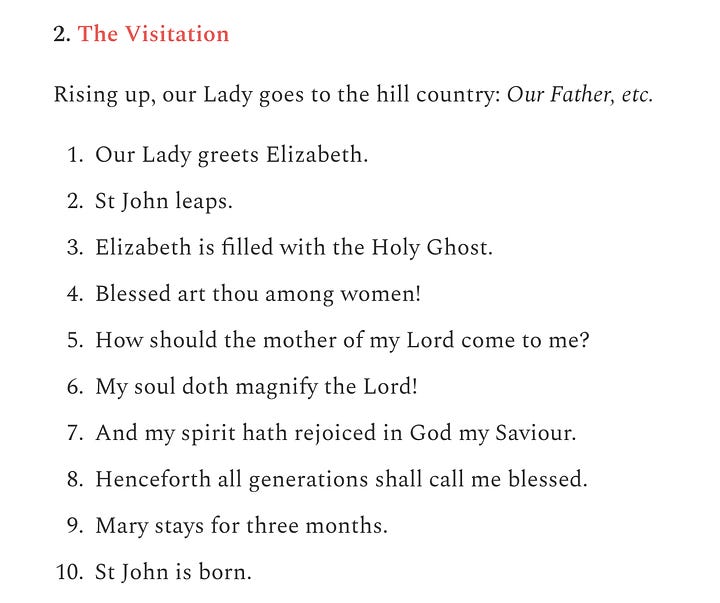
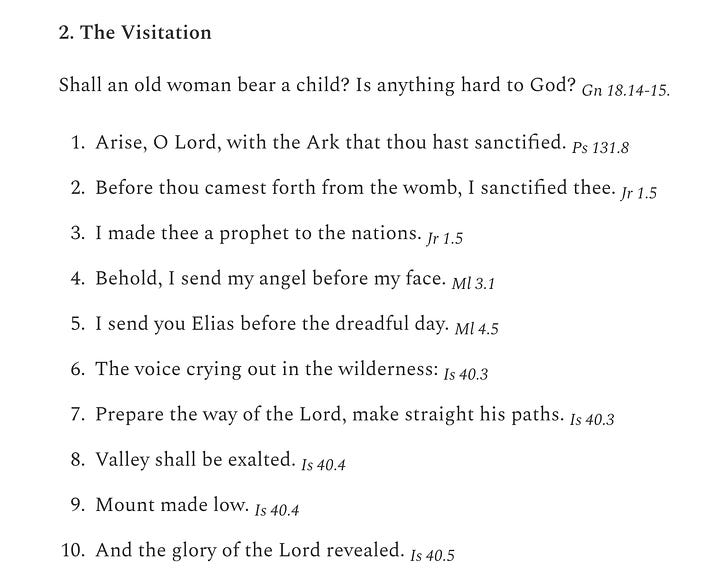
Further Reading
See also The WM Review’s Fr Henry James Coleridge SJ Archive
Follow on Twitter and Telegram:
Acts xii. 7




